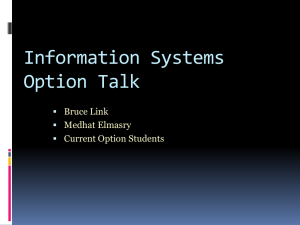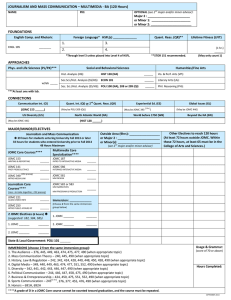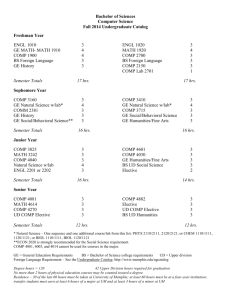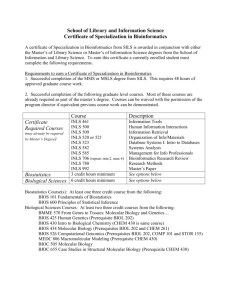Bachelor of Science in Information Science
advertisement
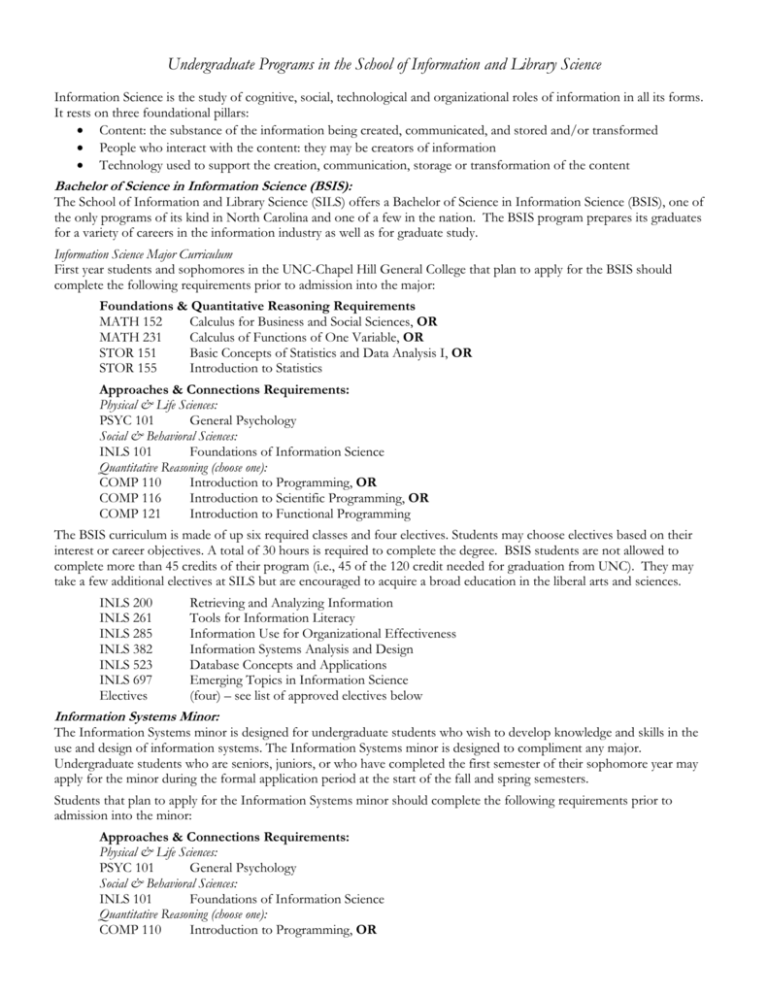
Undergraduate Programs in the School of Information and Library Science Information Science is the study of cognitive, social, technological and organizational roles of information in all its forms. It rests on three foundational pillars: Content: the substance of the information being created, communicated, and stored and/or transformed People who interact with the content: they may be creators of information Technology used to support the creation, communication, storage or transformation of the content Bachelor of Science in Information Science (BSIS): The School of Information and Library Science (SILS) offers a Bachelor of Science in Information Science (BSIS), one of the only programs of its kind in North Carolina and one of a few in the nation. The BSIS program prepares its graduates for a variety of careers in the information industry as well as for graduate study. Information Science Major Curriculum First year students and sophomores in the UNC-Chapel Hill General College that plan to apply for the BSIS should complete the following requirements prior to admission into the major: Foundations & Quantitative Reasoning Requirements MATH 152 Calculus for Business and Social Sciences, OR MATH 231 Calculus of Functions of One Variable, OR STOR 151 Basic Concepts of Statistics and Data Analysis I, OR STOR 155 Introduction to Statistics Approaches & Connections Requirements: Physical & Life Sciences: PSYC 101 General Psychology Social & Behavioral Sciences: INLS 101 Foundations of Information Science Quantitative Reasoning (choose one): COMP 110 Introduction to Programming, OR COMP 116 Introduction to Scientific Programming, OR COMP 121 Introduction to Functional Programming The BSIS curriculum is made of up six required classes and four electives. Students may choose electives based on their interest or career objectives. A total of 30 hours is required to complete the degree. BSIS students are not allowed to complete more than 45 credits of their program (i.e., 45 of the 120 credit needed for graduation from UNC). They may take a few additional electives at SILS but are encouraged to acquire a broad education in the liberal arts and sciences. INLS 200 INLS 261 INLS 285 INLS 382 INLS 523 INLS 697 Electives Retrieving and Analyzing Information Tools for Information Literacy Information Use for Organizational Effectiveness Information Systems Analysis and Design Database Concepts and Applications Emerging Topics in Information Science (four) – see list of approved electives below Information Systems Minor: The Information Systems minor is designed for undergraduate students who wish to develop knowledge and skills in the use and design of information systems. The Information Systems minor is designed to compliment any major. Undergraduate students who are seniors, juniors, or who have completed the first semester of their sophomore year may apply for the minor during the formal application period at the start of the fall and spring semesters. Students that plan to apply for the Information Systems minor should complete the following requirements prior to admission into the minor: Approaches & Connections Requirements: Physical & Life Sciences: PSYC 101 General Psychology Social & Behavioral Sciences: INLS 101 Foundations of Information Science Quantitative Reasoning (choose one): COMP 110 Introduction to Programming, OR COMP 116 COMP 121 Introduction to Scientific Programming, OR Introduction to Functional Programming The IS Minor curriculum is made up of four required classes and one elective which is selected by the student. A total of 15 hours is required to complete the minor. INLS 200 INLS 261 INLS 382 INLS 523 Elective Retrieving and Analyzing Information Tools for Information Literacy Information Systems Analysis and Design Database Concepts and Design (one) – see list of approved electives below Electives In addition to the core requirements of the major and minor programs at SILS, students are also required to complete additional coursework as electives. Students should work with their faculty advisors to create a theme with their elective choices; however, please note that concentrations are not a requirement. Courses from other departments that have been approved as electives in the past include the following: BIOS 511 (111), Intro to Statistical Computing and Research Data Management BUSI 520 (192), Business Innovation through Information Technology CHEM 442 (142), Analytical Research Techniques COMM 140, Intro to Media: Hstory/Theory/Criticism COMM 431 (130), Advanced Audio Production COMM 450 (150), Media and Popular Culture COMM 544 (144), Electronic Media Communication and Info Mach. COMM 636 (136), Interactive Media COMP 380 (180), Computers and Society COMP 401 (114), Foundation of Programming COMP 410 (121), Data Structures COMP 411 (120), Computer Organization COMP 416 (117), Intro to WWW Programming COMP 426 (118), Advanced WWW Programming COMP 431 (123), Internet Services and Protocols COMP 521 (130), Files and Databases GEOG 477 (177), Into to Remote Sensing and Digital Image Processing GEOG 491 (101), Introduction to Geographic Information Systems GEOG 591 (192), Applied Issues in Geographic Information Systems HPAA 341 (85), Computers in Health Administration (in place of INLS 261) HPAA 350 (70), Intro to Health Services Systems HPAA 380 (57), Database Design for Health Care Applications (in place of INLS 523) HPAA 440 (155), Intro to Management Information Systems in Healthcare JOMC 445 (145), Process and Effects of Mass Communication JOMC 182 (85/185), The World of Graphic Design JOMC 187 (88/188), Intro to Multimedia JOMC 482 (185/485), Publication Design JOMC 483 (186/486), Promotion Design JOMC 484 (187/487), Information Graphics JOMC 581 (188/488), Multimedia Design JOMC 582 (188/488), Interactive Multimedia Narratives JOMC 583 (189/489), Multimedia Programming and Production MUSC 239 (39), Intro to Music Technology PHYS 633 (193), Scientific Programming PLCY 450 (78), Computer Applications in Policy and Planning PSYC 210 (30), Statistical Principles of Psychological Research PSYC 230 (20), Cognitive Psychology
